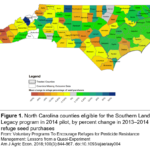
GES Colloquium | Ramon Leon – Weeds and Herbicide Resistant Crops: When Optimism Backfires
GES Colloquium, 1/22/19 - Ramon Leon | The rapid evolution of herbicide resistant weeds and the lack of new herbicides has prompted a reevaluation of how HR crops should be considered just a component within a more complex integrated management system and not as the sole tool for ensuring weed control. The excessive optimism that the agricultural and scientific community exhibited during the first years of use of glyphosate resistant crops reduced our ability to identify the limitations of the technology and the negative consequences of not taking corrective actions on time.This is a cautionary tale that should inform the introduction and use of new HR traits....
The Problems Driving Resistance to Bt Crops—and Some Proposed Solutions
By: DOMINIC REISIG, Entomology Today | Bt crops—those genetically engineered to produce an insecticidal toxin from the bacterium Bacillus thuringiensis—are special due to their benefits: reducing foliar insecticide applications, which increase populations of beneficial insects and minimize environmental harm; reducing pest populations throughout the landscape; and preserving yield, to name a few. Therefore, preventing resistance to Bt crops is important and is usually formalized in a set of Insecticide Resistance Management (IRM) practices. Because bollworm is now resistant to two Bt toxin families in cotton, IRM practices may have to change to slow resistance to other Bt toxins....Continue reading "The Problems Driving Resistance to Bt Crops—and Some Proposed Solutions"

Pesticide Resistance Arms Race
In this episode we talk with Fred Gould, William Neal Reynolds Professor of Agriculture and Life Sciences, about the rising rates of herbicide and pesticide resistance, the current state of the resistance arms race and what we need to do in the future to protect our crops and human health from resistant pests. Length: 15 minutes...
Kuzma in Scientific American article: Weeds Are Winning in the War against Herbicide Resistance
Herbicides are under evolutionary threat. Can modern agriculture find a new way to fight back? Excerpt: For farmers, protecting fields from pests and plagues is a constant battle fought on multiple fronts. Many insects have...